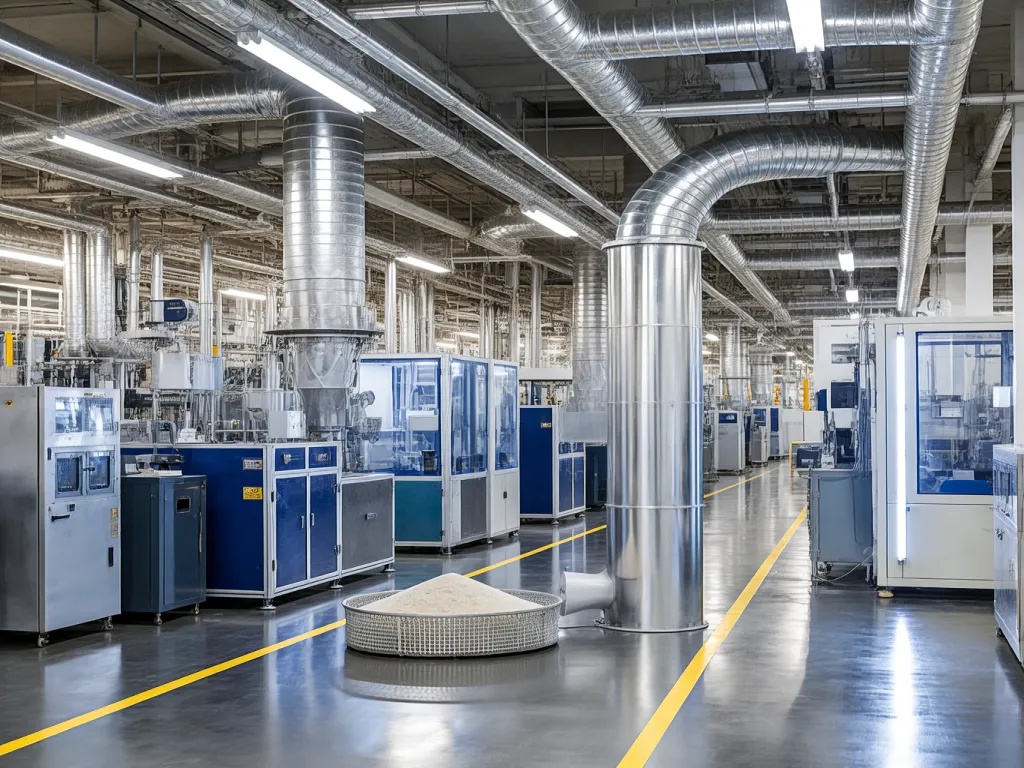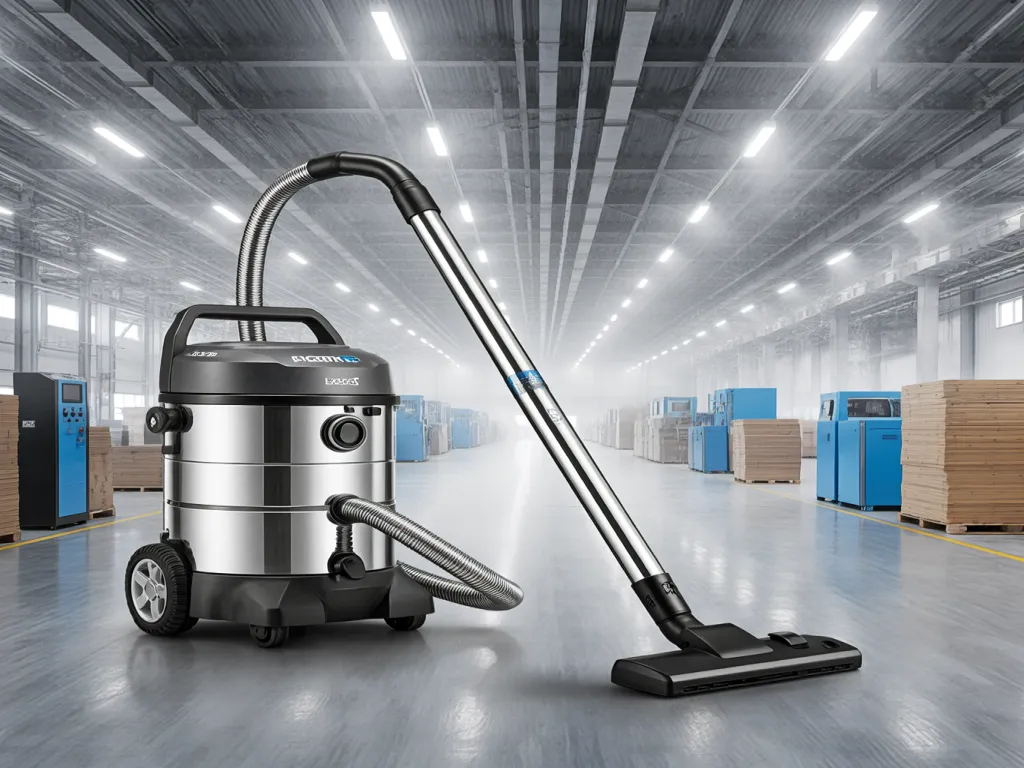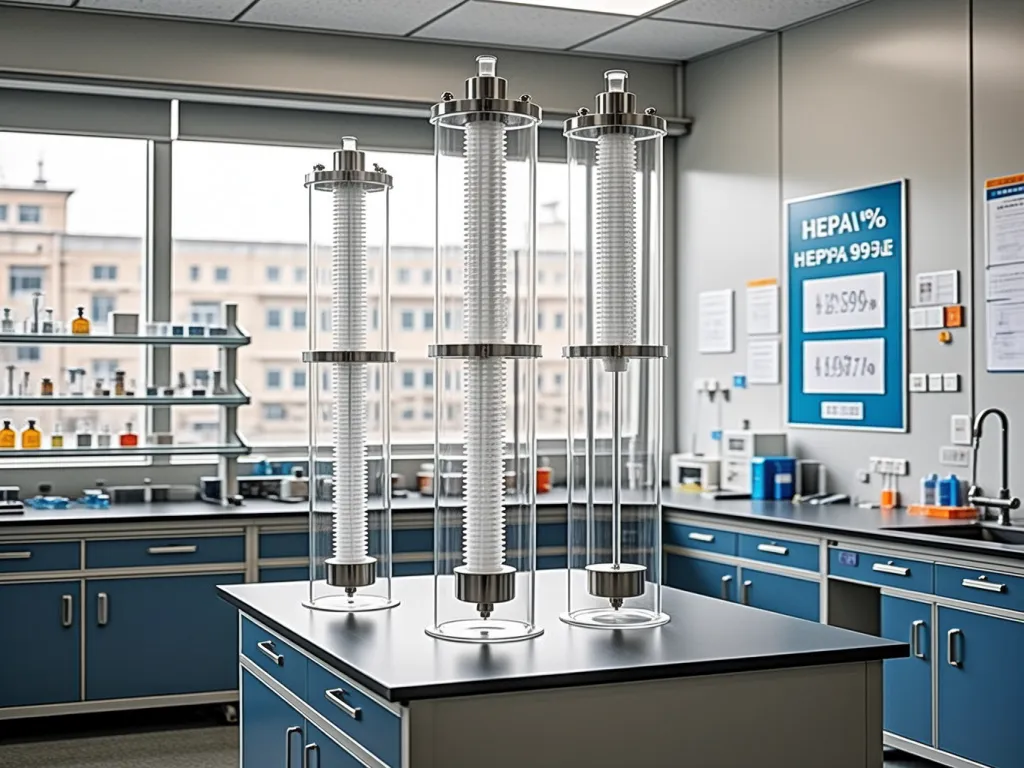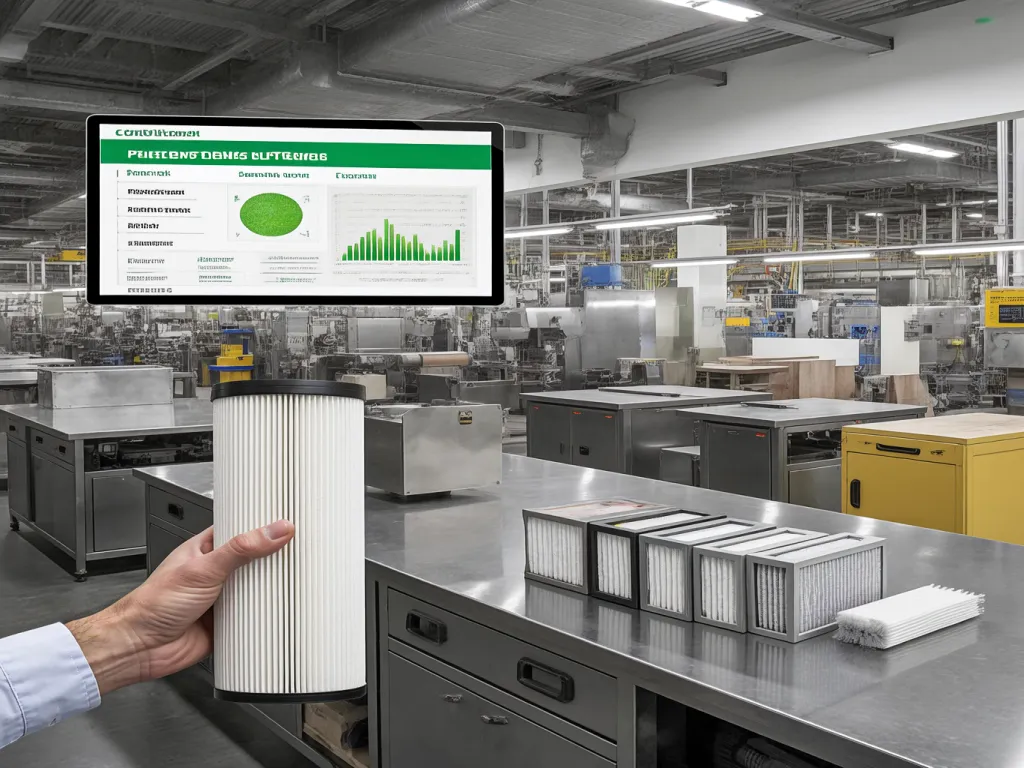HEPA Power: Shop Vac HEPA Filter Bag Guide
When it comes to tackling industrial dust and fine particles, nothing beats the efficiency of a shop vac equipped with a HEPA filter bag. But what makes these bags stand out in the crowded world of industrial filtration? Whether you’re an industrial equipment buyer, a maintenance engineer, or an EHS specialist, understanding the role of HEPA technology in your shop vac can revolutionize your workspace’s cleanliness and safety. So, how do you choose the right shop vac HEPA filter bag for your specific needs? Let’s dive in and explore the secrets to optimal industrial dust management.

HEPA Filtration Technology Unveiled: Principles and Industrial Applications
When it comes to industrial filtration, few technologies have made as significant an impact as HEPA filtration. If you’re an industrial equipment procurement manager, maintenance engineer, or environmental health and safety specialist, understanding HEPA filtration technology is crucial for ensuring a clean and safe working environment. So, what exactly is HEPA, and how does it work its magic in industrial settings?
HEPA, which stands for High – Efficiency Particulate Air, is a type of air filter that can trap an extremely high percentage of airborne particles. For a more in – depth understanding of HEPA filters, including their types, efficiency levels, and effectiveness in air purification, you can refer to this comprehensive guide. The secret behind its effectiveness lies in its unique filtration mechanism. HEPA filters are made up of a matrix of randomly arranged fibers. These fibers create a complex network of paths for air to flow through. As air passes through the filter, three main mechanisms come into play: interception, impaction, and diffusion.
Interception occurs when larger particles traveling in the air stream come into contact with the fibers and get stuck. It’s like a net catching big fish. Impaction happens with medium – sized particles. Due to their inertia, they can’t follow the air stream’s curves around the fibers and instead collide with them, getting trapped. Diffusion is the process that captures the smallest particles. These tiny particles move in a random, zig – zag pattern due to Brownian motion. As they bounce around, they’re more likely to come into contact with the fibers and be captured.
Now, let’s talk about why HEPA filtration is so important in industrial filtration settings. Industrial processes often generate a large amount of fine particulate matter. These particles can be as small as 0.3 microns or even smaller. For example, in metalworking, the grinding and cutting processes release metal dust particles. In pharmaceutical manufacturing, powder handling can create fine drug particles. If these particles are not effectively filtered out, they can pose serious health risks to workers. Inhaling metal dust can lead to respiratory diseases, while exposure to certain drug particles can cause allergic reactions or other health issues. According to research on particulate matter and health, fine particulate matter can have significant impacts on human health.
Moreover, fine particulate matter can also damage industrial equipment. Dust particles can clog up machinery, reducing its efficiency and lifespan. In a food processing plant, for instance, if dust particles are not filtered, they can contaminate the food products, leading to quality issues and potential health hazards for consumers. HEPA filters, with their high – efficiency particle capture capabilities, can effectively remove these fine particulates from the air, creating a cleaner and safer industrial environment.
In industrial vacuum cleaners, the use of HEPA filter bags is particularly crucial. Traditional vacuum cleaner bags may not be able to capture such small particles. A shop vac HEPA filter bag, on the other hand, is specifically designed to meet the high – efficiency filtration standards of HEPA. It ensures that when you’re cleaning up industrial debris, the fine particles are trapped inside the bag and not released back into the air. This not only protects the health of workers but also helps maintain the cleanliness of the entire industrial facility. So, have you ever considered how much of an impact a simple filter bag can have on your industrial operations?

The Science Behind HEPA Filtration
As mentioned earlier, HEPA filters rely on interception, impaction, and diffusion to capture particles. The combination of these three mechanisms allows HEPA filters to achieve an impressive filtration efficiency. Most HEPA filters can remove at least 99.97% of particles that are 0.3 microns in size. This high level of efficiency is what sets HEPA apart from other types of filters. To put it into perspective, a regular dust bag in a vacuum cleaner may only capture a fraction of these fine particles, leaving a significant amount of harmful dust in the air. For more details on how HEPA filters work, you can check out this article.
Industrial Applications of HEPA Filtration
HEPA filtration finds a wide range of applications in different industrial sectors. In the electronics industry, where cleanliness is of utmost importance, HEPA filters are used to maintain a dust – free environment during the manufacturing of sensitive components like microchips. In the automotive industry, HEPA filters are installed in paint booths to capture overspray and fine paint particles, ensuring a high – quality finish and protecting workers from inhaling harmful chemicals. In the aerospace industry, HEPA filtration is used to clean the air in manufacturing and assembly areas to prevent contamination of aircraft components.

Shop Vac HEPA Filter Bag Performance Evaluation: Analyzing HEPA Filtration from Efficiency, Dust Capacity, and Resistance
When it comes to industrial cleaning, the performance of your shop vac HEPA filter bag can make or break your operational efficiency. But how do you truly assess whether a HEPA filter bag is up to the task? Let’s dive into the three core metrics: filtration efficiency, dust holding capacity, and airflow resistance. These aren’t just technical specs—they directly impact how clean your workspace stays and how long your filter lasts.
First up: filtration efficiency. This is the big one. A true HEPA filter bag must capture at least 99.97% of particles as small as 0.3 microns. That’s smaller than most bacteria and many viruses. But here’s the kicker: not all ‘HEPA-type’ bags meet this standard. Some manufacturers use loose terminology, so always check for certification labels like ‘True HEPA’ or ‘HEPA Class H13/H14’. In industrial settings where you’re dealing with fine metal shavings, welding fumes, or pharmaceutical dust, this level of filtration isn’t just nice—it’s critical for worker health and regulatory compliance. Studies such as this one on industrial filtration systems further underscore the importance of rigorous standards.
Next, let’s talk dust holding capacity. This is where many users get tripped up. A bag might filter well initially but clog rapidly when faced with heavy dust loads. Look for products specifying their dust capacity in grams or pounds. Industrial environments generating large volumes of fine dust (think woodworking, cement mixing, or metal grinding) need bags with higher capacity to reduce frequent replacements. Some premium bags use multi-layer designs with pre-filtration layers to extend main HEPA filter life—a smart feature for high-volume operations.
Now, the often-overlooked metric: airflow resistance. This measures how much the filter bag restricts airflow as it collects dust. Initial resistance should be low (typically <1.0 inches of water gauge), but what matters more is how resistance increases over time. A bag that maintains stable airflow longer means your vacuum maintains suction power better, improving cleaning efficiency. Some industrial bags incorporate pleated designs or advanced media that minimize resistance buildup compared to standard flat bags.
Filtration Efficiency: The Core Metric
The gold standard for HEPA filters is capturing 99.97% of 0.3-micron particles. Why 0.3 microns? Because this size represents the ‘most penetrating particle size’ (MPPS) where filters are least efficient. Smaller and larger particles are actually easier to catch. In industrial settings, this means your filter bag isn’t just trapping visible dust—it’s capturing ultrafine particles that can cause respiratory issues or contaminate sensitive processes. Always verify third-party testing certifications when evaluating claims. For deeper insights into filtration mechanisms, refer to research like this study.
Dust Holding Capacity: Beyond the Label
Capacity isn’t just about volume—it’s about how the dust is distributed. Some bags use graduated fiber density that traps coarse particles first (preserving HEPA layers for fines), while others have uniform construction. For industries like foundries or composites manufacturing dealing with mixed particle sizes, this design difference can double effective capacity. Look for capacity data measured under realistic airflow conditions, not just static tests.
Airflow Resistance: The Silent Performance Killer
High resistance means your vacuum motor works harder, consuming more energy and potentially overheating. In continuous-use industrial applications, this directly impacts operating costs. Some advanced bags use electrostatic media that maintains low resistance even as dust loads increase. Compare initial and final resistance specs—a bag that goes from 0.8″ WG to 3.0″ WG when full will lose 75% of its airflow, while a premium bag might only reach 1.5″ WG at capacity.

Practical Selection Guide: Choosing High-Efficiency HEPA-Filtered Shop Vac HEPA Filter Bags for Industrial Scenarios
When it comes to industrial environments, the right choice of a shop vac HEPA filter bag can make all the difference in maintaining cleanliness and protecting worker health. HEPA (High-Efficiency Particulate Air) filters are renowned for their ability to trap 99.97% of particles as small as 0.3 microns, making them indispensable in settings where fine dust and particulates are prevalent. For more context on HEPA filter technology, you can refer to this comprehensive HEPA guide. But how do you choose the best HEPA-filtered shop vac bag for your specific industrial needs? Let’s dive into some practical advice, combining real-world scenarios with brand comparisons and user reviews.
Firstly, consider the industrial context. Are you dealing with woodworking dust, metal shavings, or chemical powders? Each scenario demands a different level of filtration and durability. For instance, in a woodworking shop, you’ll need a bag that can handle not just sawdust but also potential resin and oil particles. Look for bags labeled as ‘heavy-duty’ or ‘industrial-grade’ that specify their compatibility with woodworking debris.
Now, onto brand comparisons. Brands like Festool, DeWalt, and Ridgid are well-known in the industrial tool sector, each offering HEPA-filtered shop vac bags. Festool, for example, is praised for its precision-engineered filters that fit seamlessly into their vacuums, ensuring optimal performance. DeWalt, on the other hand, is known for its robust construction and affordability, making it a favorite among small to medium-sized workshops. Ridgid emphasizes durability and ease of replacement, with bags designed to withstand rigorous use without compromising filtration efficiency.
User reviews are invaluable in this selection process. Platforms like Amazon, Home Depot, and specialized industrial forums are treasure troves of firsthand experiences. Look for reviews that detail the bag’s performance in similar industrial settings to yours. Pay attention to comments on longevity, ease of installation, and any issues with leakage or reduced suction power over time. A common praise point among users is the ‘long-lasting’ nature of certain brands’ bags, which can save costs in the long run despite a higher initial price.
Another crucial aspect is the bag’s capacity and how it aligns with your cleaning routine. If you’re in a high-dust environment, opt for a larger capacity bag to minimize downtime for bag changes. Conversely, in a cleaner setting, a smaller, more frequent replacement might be manageable. Also, consider the bag’s resistance to moisture and chemicals if your workspace involves such elements. Some bags are specifically treated to resist moisture absorption, preventing clogs and maintaining airflow.
Price versus value is another consideration. While it’s tempting to go for the cheapest option, remember that a HEPA-filtered shop vac bag is an investment in your workspace’s air quality and your team’s health. Sometimes, paying a bit more upfront for a reputable brand can translate to fewer replacements, better performance, and ultimately, cost savings.
Lastly, don’t overlook the importance of compatibility. Ensure the bag you choose fits your shop vac model perfectly. Many manufacturers offer compatibility charts on their websites, or you can contact customer service for guidance. An ill-fitting bag can lead to leaks, reduced suction, and compromised filtration, negating the benefits of a HEPA filter.
Real-World Scenarios and Specific Needs
Let’s take a closer look at how different industrial scenarios influence your choice. In a metal fabrication shop, for instance, you’ll encounter not just metal shavings but also potentially harmful metal dust. Here, a bag with a higher micron rating might be necessary to capture finer particles, along with a robust outer layer to prevent punctures from sharp debris. Conversely, in a pharmaceutical or food processing plant, where cleanliness is paramount, you’ll need a bag that’s not only HEPA-filtered but also possibly sterile or treated to resist bacterial growth. For insights into the global market trends for such filtration solutions, you might find this bag filter market report informative.
Evaluating Brand Reputation and Innovation
Beyond the big names, consider emerging brands that might offer innovative solutions. Some newer entrants are focusing on eco-friendly materials, biodegradable bags, or even smart technology that alerts you when the bag is full or needs replacement. While these might come at a premium, they represent the future of industrial cleaning solutions, aligning with sustainability goals and enhancing operational efficiency.
Leveraging User Reviews for Informed Decisions
When sifting through user reviews, look for patterns. Multiple mentions of a bag’s durability in harsh conditions or its effectiveness in trapping specific types of dust can guide your decision. Also, pay attention to negative reviews to identify potential deal-breakers, such as frequent clogging or difficulty in installation. Remember, a single negative review might be an outlier, but a cluster of similar complaints warrants caution.
Navigating the world of industrial filtration doesn’t have to be daunting. By understanding the power of HEPA technology and how to evaluate a shop vac HEPA filter bag’s performance, you’re well-equipped to make an informed decision. Remember, choosing the right filter bag is more than just a purchase—it’s an investment in a cleaner, safer industrial environment. So, why wait? Upgrade your shop vac with a high-performance HEPA filter bag today and experience the difference firsthand. Ready to explore more industrial filtration solutions? The journey to a dust-free workspace begins now!
